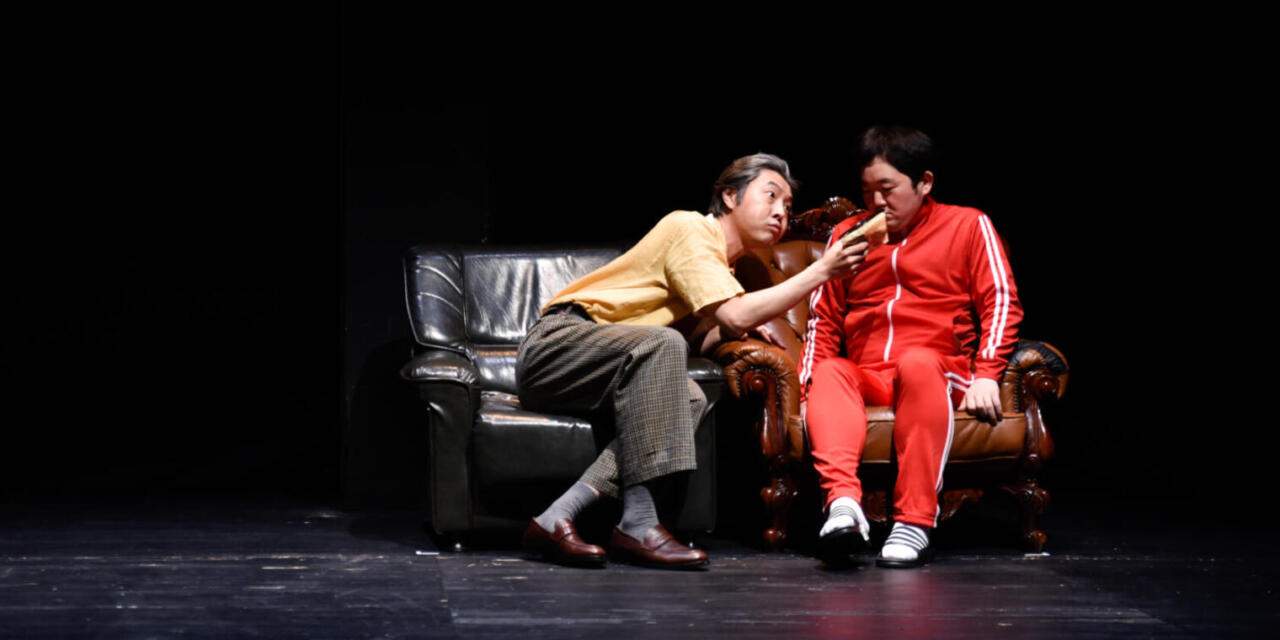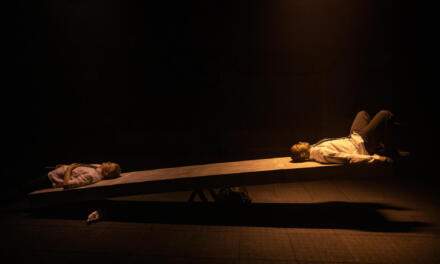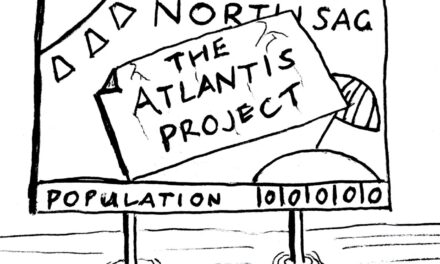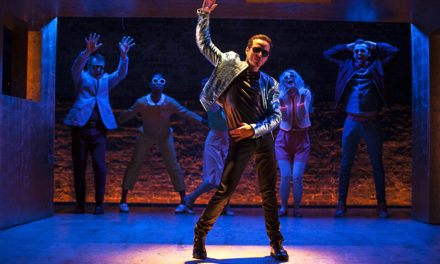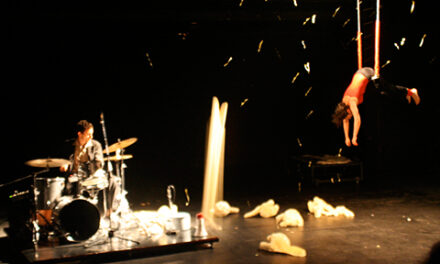Yun Mi Hyun is a playwright based in South Korea. After writing fiction and poetry in her early career, she debuted as a playwright in 2012 with the one-act play Can We Meet?, which won the Korean Playwright Association new play award. Her major works include The Vegetable Garden Killer (2012), Young Husidin: A Love Story (2014), Chulsoo’s Rebellion (2015), Texas Aunt (2017), and The Wooden Boat (2019). She has also written the book and lyrics for numerous new musicals and operas. Her plays have won many awards, including the Byeoksan Drama Award, best play at the Donga Theatre Awards, best play at the Seoul Theatre Festival, and the Presidential Award at the Korean Theatre Festival.
This interview was conducted over Zoom on August 23, 2022 as part of my translation process for The Wooden Boat and Texas Aunt, which was commissioned by Company Bomm (Artistic Director Sohn Shin-Hyung) in Seoul, South Korea. This interview has been edited for length and clarity.

Yun Mi Hyun
Kee-Yoon Nahm: You wrote fiction and poetry before becoming a playwright. What prompted the turn to playwriting?
Yun Mi Hyun: I had no idea that I would end up writing plays. In fact, I wasn’t interested at all in playwriting—I thought that literature was only about poetry and fiction. When I was in grad school as a creative writing major, I didn’t like any of the plays I had to read for class. So, I decided to give playwriting a try. Even then, I just wanted to submit a one-act to a play competition and stop there. I remembered my professors in college telling me that if you switch from writing fiction to drama, your style changes. I didn’t want that to happen. But writing plays turned out to be so fun, I kept going.
I actually get asked this question a lot, so I have a prepared answer. I usually say that the language feels two-dimensional in poetry and fiction, as if the words are all lying down on the page. Compared to that, theatrical language is alive. That’s my go-to answer. But actually, I think all that time I spent writing poetry and fiction was well worth it. In poetry, every period, every comma means something. It’s all part of the language. I think playwriting is the same. So, there are a lot of similarities.
Nahm: That makes sense. Plays were almost always written in verse before the modern era. And even now, there are many poets who think of their poems as monologues to be performed live. But I guess the big difference is that as a playwright, you have to work together with other theatre artists. What was that experience like when you started working in the theatre?
Yun: There are all kinds of people in the theatre world—people with personalities and inclinations different than mine. I was more fascinated with the diverse people I met rather than how they interpreted my plays. The theatre is always unpredictable, like the weather.
Nahm: Do you attend rehearsals often?
Yun: I didn’t at first. But recently, I’m trying to attend rehearsals as much as possible. I’m actually interested in directing in the future. Nobody knows about my ambitions yet!
Nahm: That’s interesting. I actually wanted to ask you about directing. In South Korea, it’s common for directors to write their own plays. When I do research on new Korean plays, I often discover that the playwright is first and foremost a director. So, I’ve always wondered whether it’s difficult for someone to work only as a playwright in the Korean theatre. If directors have so much power, can it be hard to get your voice heard as a professional playwright?
Yun: I think I’ve had it pretty easy for someone who only writes plays and doesn’t direct. All of my productions went smoothly. I think that’s partly because I’ve rarely been approached by directors to write plays for them. From the one-act festival where I made my debut to my recent work such as The Wooden Boat and Texas Aunt, I’ve entered a lot of play competitions. And when my plays are selected, the organization asks me first what directors I want to work with. So, I’ve generally had great relationships with directors. I’ve heard that when directors approach playwrights for a project, the process can be difficult for the playwright. But that hasn’t happened to me because I reach out to them first, or the host organization does.
Nahm: So, you’ve benefitted a lot from play competitions. Are there a lot of opportunities like that for playwrights?
Yun: No, there aren’t. Apart from the annual new writers’ awards that the major newspapers host, there aren’t many opportunities. I’ve already won virtually every play award there is in Korea.
Nahm: There are more opportunities for new play development in the United States than South Korea, including residencies and fellowships where playwrights can write without worrying about an immediate production. Getting feedback on your work can be helpful, but I can see how a playwright might want to figure things out on their own first.
Yun: You’re right. I’ve only started productions after I’ve felt that the play was done. Right now, I’m working with Lee Sung-Yeol [artistic director of Theatre Company Baeksukwangbu and former artistic director of the National Theatre Company of Korea] on a play that he is commissioning and directing for his company. It’s different from how I’ve worked in the past, and I’m finding that there are more things to consider. It’s harder to focus on just the writing. It’s a different process.
Nahm: What is your writing process generally like? Do you tend to write fragments and connect them later, or write the entire play from beginning to end?
Yun: I never write in fragments. I lose the rhythm of the play if I do that. Even if I connect the scenes later, it’s not the same. I usually spend two or three years thinking about the play and taking notes. But when it’s time to write, I write it all at once, like pushing out a rope of white rice cake. That way, there aren’t seams in the writing and the play moves quickly. I also try not to edit the play too much after I write. It takes a lot of focus, but I like writing the whole play all at once.
Nahm: Your plays often examine social issues in Korea. I also find that your plays show how these social issues affect everyday life. Is that something that you consciously think about when you write?
Yun: If I approached these issues consciously, I don’t think they would have melded organically with the drama. I read the newspaper a lot when I was young, from elementary school all the way to college. Even now, reading the news is a natural part of my daily routine, like reading a novel. So, even if I don’t think consciously about social issues when I write, these things—politics, the economy, and so on—filter into the stories and characters I create without my being aware of it. If I set out to write plays specifically about these topics, people would catch on quickly.
Nahm: This is a perfect segue into the two plays of yours I am currently translating. Let’s start with The Wooden Boat. What led you to write this play?
The Wooden Boat SynopsisSet in contemporary South Korea, The Wooden Boat tells the story of Mr. Chae, an elderly man who longs to return to his hometown in North Korea before he dies. Over sixty years ago, he was separated from his wife and newborn child when the two Koreas were divided by ideological strife. Mr. Chae has tried everything in his power to see his family again, but to no avail. He grows desperate, feeling his life coming to an end. Upon hearing a news report about a North Korean fishing boat that landed in South Korea, Mr. Chae comes up with an idea to hitch a ride on one of these “ghost ships.” A group of neighbors, each with their own problems, approach Mr. Chae to help him with his plan, eyeing his sizable wealth. The ringleader is Mr. Ma, a real estate agent with a history of fraud. A highly educated but unemployed young man is his sidekick, while Mr. Mok, who lost his savings in a phishing scam, builds a rickety wooden boat. Will Mr. Chae see his family again, or is he being sent to his death? Winner of the prestigious 2019 Byeoksan Drama Award, Yun Mi Hyun’s satirical drama compresses modern Korean history into a lively romp that uncovers what South Korea had to sacrifice to become the nation it is today. |
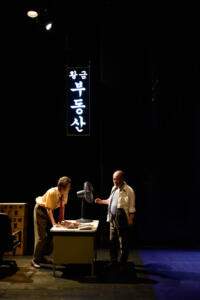
The Wooden Boat, by Yun Mi Hyun, directed by Hansol Yoon, Daehakro Arts Theatre production (2021). Photo courtesy of greenpig.
Yun: Kim Dae-jung became president when I was in high school, and I remember him focusing on peaceful talks with North Korea during my first or second year of college. As part of that initiative, his government promised to help families separated during the Korea’s division find each other, and they kept that promise. I remember seeing the family reunion broadcasts run on the news nonstop for days. But I had a lot of complicated thoughts and feelings as I watched those reunited families on TV. The state is not only responsible for the war that separated these people; it has also denied these people the emotional closure of reuniting and embracing one another for 50, 60 years. This can only happen in a divided nation, and Korea is one of the only divided nations left in the world.
That’s when I felt that state violence also included violence against the feelings of individuals. We tend to think of the state in terms of large ideas such as war and divided borders. But from a single person’s perspective, things like nationhood and government may not be directly relevant to their emotional life. All these separated families want is a chance to see their loved ones across the border again. But the state has the power to block that kind of emotional relief until these people die. I felt intense pain when I understood the reality that we live in. I mean, I felt pain even though the Korean War didn’t separate me from my family. How would those people feel, those victims of state power who had to suppress that longing for decades? I couldn’t even fathom it.
Nahm: I remember those news broadcasts as well. We’re of the same generation. In the 90s and early 2000s, people still believed that reunification was possible.
Yun: Right. There was that song, “Our Wish is Reunification.”
Nahm: But public opinion seems completely different today.
Yun: Nobody dreams of reunification anymore. And the people who waited all their lives for reunification are passing away of old age. I think nowadays there are more people who believe that reunification shouldn’t happen. Now, all we can hope for is for war not to break out.
Nahm: That’s a good point. As displaced people grow old and pass away, there are fewer people left who have ties to hometowns and families in North Korea. For people who were born after the war, North Korea has gradually become just another country.
Yun: But if North Korea were just another country, people would be able to go there freely. But that’s impossible now.
Nahm: That’s why I think we need works of art like The Wooden Boat. I especially think that this is a great play to present internationally. A lot of the media coverage on North and South Korea has focused on refugees fleeing the North because of economic hardship and the autocratic regime. But there are also people in South Korea who have longed to visit their hometowns their entire lives. These displaced people aren’t represented in the media.
Yun: Even in South Korea, most representations of North Korea in the media or literature have focused on things like secret agents, spies, and political conflicts between the North and South. But I’ve always believed that the emotions of ordinary people are most important in our everyday lives. I believe that art is supposed to serve as a medium for those feelings. I can’t think of many examples in literature, film, or TV that explore the deep-seated feelings of these separated families. The focus has always been on “big” themes.
Nahm: Going off of how you’ve framed the play, Mr. Chae clearly seems to be the main character. He is trying to reunite with his family in North Korea before he dies. But I’m also interested in the rest of the cast. There’s Mr. Mok, who fell for a phishing scam but still doesn’t have a clue about the world. There’s the Young Man in Jogging Suit’s parents, who have to drive school buses in their old age to make ends meet. The play seems to make a broader statement about the elderly in Korea.
Yun: Before I wrote The Wooden Boat, I created what I call my senior citizen trilogy. There were my plays The Trunk (2016) and You’re Going Out Again with a Basket Balanced on Your Head (2017), as well as the new opera The Black Recorder (2019). All of these works dealt with social issues related to the elderly. I’ve been interested in these issues for a long time. In fact, my debut novella was also about senior citizens. The rest of the cast came into the picture naturally as I thought about everyday life in contemporary South Korea. I know a lot of people who were scammed like Mr. Mok. Scams preying on the elderly have been around for a long time, but they don’t go away because they keep finding new victims. You don’t have to look far to see that Korea’s in a dire situation. You don’t have to watch the news. We all know of unfortunate people like the Young Man in Jogging Suit, who studied abroad but still can’t find a job, and his mother who sacrificed everything to support his education. These life experiences merge with the predicament of displaced people like Mr. Chae to form a bleak picture of South Korean society.
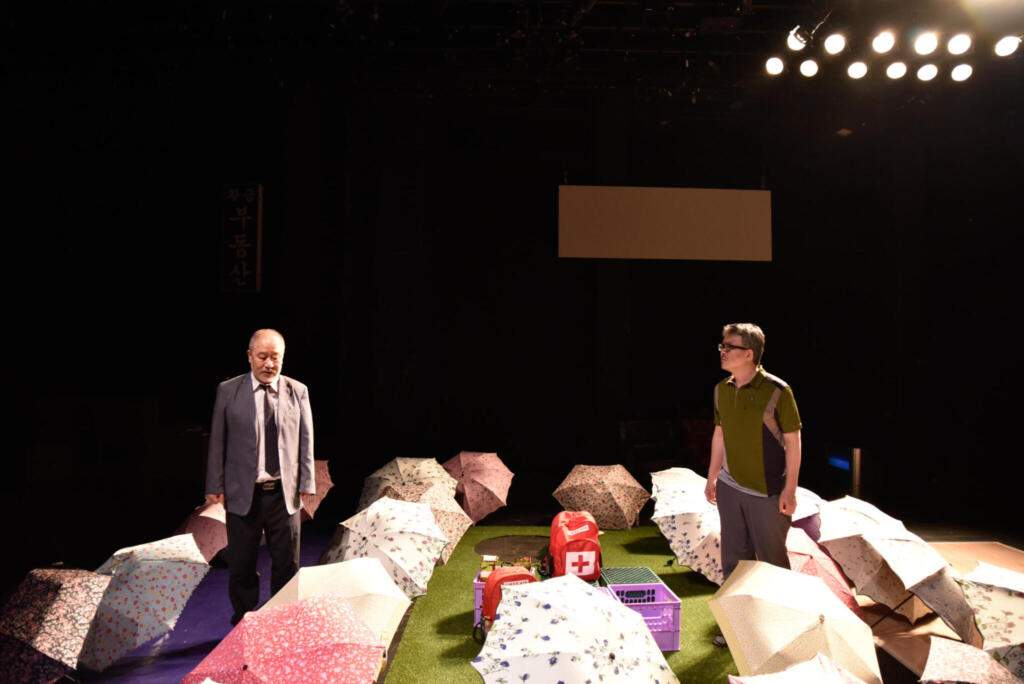
The Wooden Boat, by Yun Mi Hyun, directed by Hansol Yoon, Daehakro Arts Theatre production (2021). Photo courtesy of greenpig.
Nahm: Seen through the eyes of the elderly, South Korean society especially comes across as harsh and alienating. Society doesn’t take care of these marginalized people at all. With Mr. Chae’s story, the play looks to the past—the Korean War and the division. At the same time, the other characters show how Korea has changed since the postwar era. I feel that the supporting cast are all products of the post-IMF period, when neoliberalism and intense competition seeped into all aspects of Korean life. The Wooden Boat walks us through all of modern Korean history.
Yun: You mentioned something that I think about a lot. I’m interested in the state as a system that doesn’t care for the marginalized.
Nahm: Right. That’s the common denominator between Mr. Chae and the other characters.
Yun: That’s the fundamental theme underlying all of my work. I want to expose how South Korea abandons some of its most disenfranchised citizens and has no intention of reforming its broken systems. People are forced to live in absurd circumstances, but it has become so pervasive that we don’t recognize it as absurd anymore.
Nahm: That’s interesting. State power isn’t directly depicted in your play perhaps because that power has become so massive and normalized. How did the premiere production go?
Yun: If I’m honest, it was different from what I had in mind. The themes I wanted to express weren’t communicated clearly. I wanted Mr. Chae’s feelings to be highlighted more. But I think the director put more focus on the other characters surrounding Mr. Chae. He went in a different direction.
Nahm: You’re getting ready to direct your own staged reading of the play. The good thing about writing plays is that it doesn’t have to end with just one production. So, for you Mr. Chae’s emotions are at the center of the play?
Yun: Yes. The other con-artists are exploiting Mr. Chae’s desire to go to North Korea. So, everything ties back to his feelings.
Nahm: I see. The audience has to first understand and empathize with Mr. Chae’s desperate wish in order for the other characters to serve their roles in the story.
Continue to Part 2 of this interview.
This post was written by the author in their personal capacity.The opinions expressed in this article are the author’s own and do not reflect the view of The Theatre Times, their staff or collaborators.
This post was written by Kee-Yoon Nahm.
The views expressed here belong to the author and do not necessarily reflect our views and opinions.

